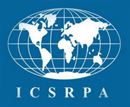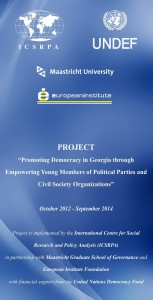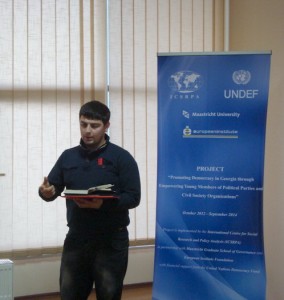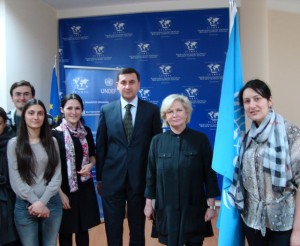In October, 2012, the International Centre for Social Research and Policy Analysis (ICSRPA) launched a new project – “Promoting Democracy in Georgia through Empowering Young Members of Political Parties and Civil Society Organizations”, financed by the United Nations Democracy Fund (UNDEF). The project is being carried out in collaboration with implementing partners – Maastricht Graduate School of Governance and European Institute.
The project aims at enhancing the role of young professionals in the development of merit-based, participatory political processes that will lead to more effective democratic governance and public policy making, as the democratization process in Georgia is severely hindered by lack of political culture, professional competencies, leadership, advocacy and policy-making skills, as well as clientelism and rent-seeking behaviour. Political parties and CSOs are not effectively involved in democratic governance, as majority of them do not have clearly formulated programs for policy-making and personnel with formal training in this area. The goal of the project is Proactive participation of young leaders in the development of merit-based, participatory political processes that will lead to a more effective democratic governance and public policy making. This goal would be achieved by engaging young members of political parties and CSOs in hands-on, personalised training activities on leadership, public policy analysis, and advocacy; providing political parties and CSOs with road map to increase their awareness on how to engage effectively and productively in democratic governance and public policy-making; conducting workshops to exchange experiences and best practices; organizing final conference to bring together training participants, key decision-makers of political parties and CSOs, representatives of international organizations, media,government representatives, and other stakeholders to learn the outcomes of the project. The proposed project is innovative in that it is a first wide-ranging initiative in Georgia that focuses on the priorities reflected in the UN’s Millennium Development Goals.
The project address the critical issue of limited inclusion of talented youth in policymaking and pays particular attention to the enhancement of role of women in political activity and decision-making processes. The project team has taken into consideration that young women, as a dually disadvantaged group, benefits from the project activities. By engaging at least 60 % of female participants in training sessions, our project aims to give them the skills necessary to be promoted to executive positions and especially to help them avoid being used exclusively as support forces and instruments of mobilization.
Within the framework of the project, in October and November, 2012, ICSRPA experts have created and developed the training curriculum focused on UN Millennium Development Goals, democratic governance, transformational leadership, political decision-making, fundamentals of public policy and policy analysis, the role of civil society and political parties in monitoring governance processes, main components of successful advocacy, gender equality issues, etc.
 The selection process was announced publicly and the announcement was also circulated within political parties and civil society organizations, who have expressed keen interest in supporting the initiative and provided the list of their young members to participate in the program. The format of training cycle is envisioned to 200 participants (100 of whom are active members of political parties and 100 of whom are members of CSOs), however the number of applicants has exceeded the proposed expectation. Totally more than 500 persons have been registered for participation, which clearly demonstrates the willingness and keen interest among young people. From December 2012 to June 2013, seven training sessions have been conducted for 140 representatives of political parties and civil society organizations. The remained applicants will be appropriately selected gradually based on their background, institutional affiliation, motivation, etc. to accept them for other proposed sessions.
The selection process was announced publicly and the announcement was also circulated within political parties and civil society organizations, who have expressed keen interest in supporting the initiative and provided the list of their young members to participate in the program. The format of training cycle is envisioned to 200 participants (100 of whom are active members of political parties and 100 of whom are members of CSOs), however the number of applicants has exceeded the proposed expectation. Totally more than 500 persons have been registered for participation, which clearly demonstrates the willingness and keen interest among young people. From December 2012 to June 2013, seven training sessions have been conducted for 140 representatives of political parties and civil society organizations. The remained applicants will be appropriately selected gradually based on their background, institutional affiliation, motivation, etc. to accept them for other proposed sessions.
The training format included presentations, practical exercises, interactive discussions, simulations, scenario planning that contributed to effective cohabitation, cohesiveness and learning outcomes and resulted in increased capacity of young members of CSOs and political parties for proactive and productive engagement in democratic governance and public policy making.
In April 2013, Deputy Head of United Nations Democracy Fund (UNDEF), Mrs. Annika Savill visited the International Centre for Social Research and Policy Analysis and met with young civil society activists participating in the Training for Future Political Leaders.







